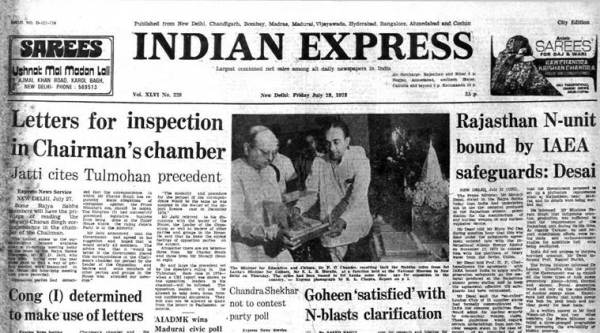 The front page of The Indian Express on July 28, 1978
The front page of The Indian Express on July 28, 1978
Prime Minister Morarji Desai stated in the Rajya Sabha that India had undertaken not to use the material produced at the Rajasthan atomic power station for the manufacture of any nuclear weapon or nuclear explosive device. Desai mentioned during question hour that this was done under the safeguards agreement entered into with the International Atomic Energy Agency on November 17, 1977 in connection with the purchase of heavy water from the Soviet Union. Desai told D P Chattopadhyaya that the agreement with IAEA bound India to apply multi-generation safeguards on the material produced at the atomic power station.
PM Clarifies
The Prime Minister’s statement in the Lok Sabha on July 27, that the government’s policy renouncing peaceful nuclear explosions did not include nuclear blasts of a limited nature for constructive purposes, caused serious concerns to the US embassy in New Delhi and set the diplomatic corps guessing whether there has been a change in India’s nuclear policy. The US ambassador, Robert Goheen, visited South Block to seek a clarification on whether Indian policy on peaceful nuclear explosions has changed.
Janata President
Chandra Shekhar, president of the Janata Party, announced that he would not contest the election to the president-ship of the party slated for October. He refused to give reasons for his not becoming a candidate. He denied he would join the Cabinet.
Kripalani’s Address
Acharya J B Kripalani is likely to address the Janata Parliamentary Party. The Janata party president, Chandra Shekhar, told the media that the prime minister was pursuing the move made by some that Jayaprakash Narayan and Acharya Kripalani should address the JPP. Chandra Shekhar, however, did not feel it was physically possible for JP to come to Delhi.